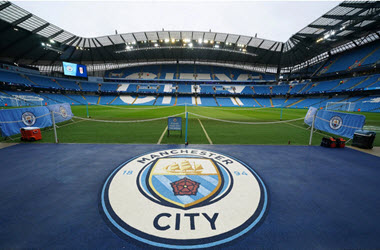UEFA Hands Manchester City Two Season Ban from Champions League

UEFA hits Manchester City with two season ban from Champions League after serious Financial Fair Play regulation breaches.
Manchester City FC, the English Premier League champion, was handed a two-year ban from the Champions League by the UEFA in a massive ruling for breaching the spending rules, a judgement that will have an impact of one of football’s wealthiest clubs.
In addition to the two-year ban the club, which is Abu Dhabi owned, was hit with a €30 million fine. This came after the UEFA investigation resultant from leaks concluded that Man City in their bid to comply with Financial Fair Play regulations was not truthful on their sponsorship revenue.
The consequences will see Manchester City FC being prevented from European competition until the 2020-2023 season, including the Champions and Europa Leagues. The result could see the club struggle to keep manager Pep Guardiola as its head coach let alone sign new players.
Commenting on the ruling, the UEFA stated
“The adjudicatory chamber, having considered all the evidence, has found that Manchester City Football Club committed serious breaches of the UEFA Champions League club licensing and financial fair play regulations by overstating its sponsorship revenue in its accounts and in the break-even information submitted to UEFA between 2012 and 2016,”
Sky News
Manchester City has stated that it intends to appeal the decision and the sanctions against stating the process is flawed. In response to the judgement, Man City stated,
“This is a case initiated by UEFA, prosecuted by UEFA and judged by UEFA. With this prejudicial process now over, the club will pursue an impartial judgment as quickly as possible. It will, therefore, in the first instance, commence proceedings with the Court of Arbitration for Sport at the earliest opportunity.”
Man City did not argue the authenticity in the emails that Der Spiegel, a German media outlet, published in October of 2018. Those emails showed that Man City was working to hide the actual revenue they received from sponsorship deals. Der Spiegel also reported that in 2015 there were internal emails that showed the sponsorship deals Man City had with Etihad Airways was being manipulated.
The airline, which is owned, has the naming rights for Man City’s stadium, its training campus and appears on its jerseys. It was reported that the sponsorship deal was annually worth £67.5 million pounds for Abu Dhabi United Group, the clubs holding company. However, the internal emails sent by Man city’s chief financial officer Jorge Chumillas, revealed that £59.9 of that £67.5 million pounds was channelled back to Etihad.
The leaked emails showed that in one situation, based on those dating back to 2013, the club attempted to raise its reported revenue by €30 million. It is alleged that the Abu Dhabi United Group was transferring cash to a shell company that was apparently created to purchase the rights to publish Man City player images in various marketing campaigns. Additional emails in 2010 from to investment from Man City’s director, who in addition is employed by the Abu Dhabi’s Executive Affairs Authority suggested that Sheikh Mansour provided the source for the sponsorship revenue used by Abu Dhabi state-owned companies. In the email it stated,
“As we discussed, the annual direct obligation for Aabar is GBP 3 million. The remaining 12 million GBP requirement will come from alternative sources provided by His Highness.”
This is not the first time that Manchester City has been punished by the UEFT for violating the Financial Fair Play regulations. The first came in 2014 when the club was hit with a fine instead of being banned when it reported revenue from sponsorship deals that was inflated. That came out in a 2014 leaked email from the team’s lawyer commenting jubilation over the passing of one of the UEFA’s lead FFP investigator.
The UEFA began, in 2011, to monitor all clubs accounts who entered both competitions in an attempt to bring an end to spending on players irrespective of the wealth the clubs owner had. The first round of compliance assessments was carried out between 2011 and 2013, a period when club owners could have losses up to €45 covered.
The irony of the situation is after being purchased bySheikh Mansour bin Zayed Al Nahyan, a Royal family member and United Arab Emirates deputy prime minister, it has become a powerhouse in the world of soccer. It has since 2012 won the Premier League on four occasions. With the club valued at close to $4.8 billion, it saw 10% of its stock being purchased by Silver Lake, a private equity firm in the United States, and with that acquisition, it joined a Chinese consortium which owns 12% of the club.
